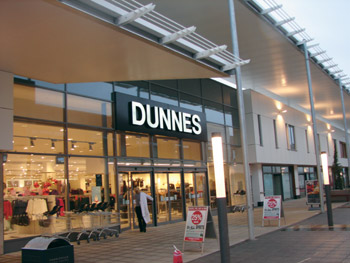Why Dunnes will be sold sooner rather than later

With consumer spending collapsing how long can the country’s second largest retailer stay in Irish hands?
10 November 2008
For more than a decade there have been occasional rumours that all or part of Dunnes Stores was about to be sold. In the late 1990s, UK food retailer Sainsbury’s was briefly mentioned in Dispatches as a possible buyer for the Dunnes Stores food outlets. Then around the turn of the century WalMart ran the slide rule over Dunnes with a price tag of IR£2bn (€2.54bn) being mentioned
However, every suitor has been rebuffed by Dunnes Stores. Margaret Heffernan was not for selling the company founded by her father Ben Dunne Senior in 1944. She was determined to keep the business in the family. Up to now at any rate.
The rumour mill working overtime
The latest rumours of a possible Dunnes sale have been the strongest yet. At the time of going to press the Dublin rumour mill had been buzzing for almost a week with reports that ASDA, the UK multiple acquired by WalMart in 1999, was about to purchase Dunnes.
Lending credence to the rumours was Dunnes Stores stubborn refusal to make any comment on the sale reports. Instead, Dunnes stuck to its traditional policy of “no comment” allowing the rumours to continue unchecked. Dunnes Stores’ reluctance to comment on the rumours is hardly surprising. If it were to issue a statement now would it not have to do the same every time similar tittle-tattle resurfaced in the future?
However, by refusing to issue a short statement strongly denying the rumours as soon as they first surfaced, Dunnes allowed those rumours to gain ever more credibility. If Dunnes Stores wasn’t for sale then why didn’t the company simply issue a statement to that effect?
Dunnes’ refusal to comment on the rumours reveals a disturbing lack of understanding on the company’s part of the central role it occupies in the Irish economy. With 153 stores, 114 of them in the Republic, 18,000 employees, along with tens of thousands of others who work for its suppliers, and an annual turnover well in excess of €2bn it is simply not good enough for the firm to keep saying nothing.
By refusing to comment on the rumours Dunnes put its suppliers and staff through hell. As one of the largest companies in the country Dunnes Stores has, whether it likes it or not, certain obligations to its staff, suppliers and the rest of us.
So just what on earth is going on at Dunnes Stores?
When UK retailing giant Tesco bought Quinnsworth in 1997 there were dire predictions for the future prospects of the Irish-owned retailers. How could Dunnes hope to compete with an 800lb gorilla? Then in 1999 the German discounters Aldi and Lidl entered the market for the first time. Surely, it would only be a matter of time before Dunnes and the other Irish retailers succumbed to the foreign invaders?
Except that things didn’t work quite as had been predicted. Dunnes Stores apparently more than held its own in the new more competitive retailing environment. The most recent market research figures show that it still has a 23.9% share of the Irish grocery market, only just behind Tesco on 26.3%.
As the Celtic Tiger boomed so, it seemed, did Dunnes Stores. It opened several new stores and revamped many existing ones including its flagship Cornelscourt outlet. The old St Bernard tag was ditched in favour of a new more up-market own label.
But were things ever that good at Dunnes? Unfortunately, unlike the other Irish-owned food retail group Musgrave, Dunnes doesn’t publish its accounts. This means that we have to take it on trust that Dunnes Stores is profitable.
What is indisputable is that as the economy has softened over the past year, Dunnes has begun to feel the pinch. Retail sales have been in freefall for most of this year with the most recent CSO figures showing a 6% fall in the seven months to August. Retail sales have since fallen even further with the annualised rate of decrease now running at well over 10%.
At the same time as retail sales have been falling spending patterns have shifted. With money now much tighter shoppers are no longer purse proud. In the new recession chic, shopping at Aldi and Lidl is now all the rage.
Dunnes hit hard by deep discounters
Between them Aldi and Lidl now have almost 150 stores and a combined market share of 7.1%. While Dunnes has successfully defended its market share against both Tesco and the Germans there are clear signs that this success comes at the expense of the bottom line. In August it emerged that Dunnes Stores put plans to open several new stores on ice.
Dunnes Stores now finds itself squeezed between its two major rivals. At the top end of the market it must compete with Tesco, which with worldwide sales of more than Stg£47bn (€59bn) is now almost 30 times bigger than Dunnes. Meanwhile Aldi and Lidl are busy expanding their presence at the lower end of the market.
Conventional full-service food retailers typically carry over 30,000 stock items in their stores and pay out about a tenth of their sales in wages (Tesco’s wage costs represent 10.6% of its turnover). By comparison the discounters generally carry only about 1,000 lines, have much smaller shops (generally no more than 15,000 sq ft) and pay out less than 5% of their sales in wages.
Senior Dunnes Stores managers have been looking covetously at the discounters’ lower wage costs. They are keen to trim what they see as Dunnes’ excessive payroll. However, even if Dunnes could succeed in massively cutting its wage bill without triggering an all-out strike by the shopworkers union Mandate, such a radical course of action would almost certainly fail to solve its problems.
With smaller stores, narrower product ranges and much simpler supply chains, discounting is a fundamentally different business to full-service food retailing. How could Dunnes successfully convert huge new and revamped stores such as Bishopstown in Cork and Cornelscourt, on which it has spent hundreds of millions of euro, to a discounting format?
The answer of course is that it couldn’t. The fact that such incoherent strategic thinking is now apparently finding favour among Dunnes Stores senior management illustrates the extent of the problems facing the company. While the current rumours are almost certainly untrue, the challenges facing the company will almost certainly result in a sale of Dunnes Stores sooner rather than later.



 Print
Print






Fans 0
Followers